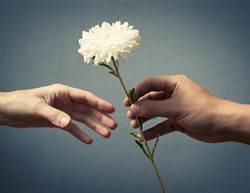When we make a mistake, it may not hit the headlines but that’s sure how it feels – as if an old-fashioned town crier were yelling out every detail of our crime: “She didn’t get the promotion she wanted”; “This lady texted her ex (again)”; “This one, well, she ran into the back of a parked car”. It can be overwhelming, even as an adult.
For psychologist Dr Marny Lishman, mistakes come in all sizes. One of her biggies was to turn up at the airport for much-anticipated overseas trip with an out-of-date passport. Panic and some tears ensued. She missed the flight and had to go home. But two days later she was on another flight. She survived that mistake and is now forever checking the dates on passports. And that’s the key, Lishman says, to overcoming the mistakes we make.
“Ask yourself what is the worst that will happen. Generally, the answer is that it’s something you will survive.” It may not feel great at the time, but according to experts there’s a positive side to all those mistakes and with some simple strategies you can stop lying awake at night reliving the pain.
We're all human
If you’ve heard it once, you’ve heard the line “we’re all human” a thousand times, often said in an attempt to make us feel better when we’ve made a mistake. But does it make it any easier to deal with your slip up? Usually no.
For Kate, her big mess up moment happened at the reception after her only daughter’s wedding. Kate put her hand into her bag to retrieve her speech, only for her heart to skip a beat. It wasn’t there. With sickening clarity Kate remembered leaving it on the bed at home. On shaking legs, she stood up in front of the assembled guests all waiting to hear the words she’d spent so many hours polishing, and promptly burst into tears.
“I still wake up at night in anguish about that,” says Kate even though it’s now three years later. But there is real science that explains why making big life mistakes is so terrifying. “Our fear of making mistakes is innate,” explains Lishman. “From an evolutionary perspective we’re all about survival and if our ancestors made a mistake they would have been kicked out of the pack. That was the main threat we had, so anything we could do to conform so that the rest of the pack would keep us safe we did.”
Dr Rick Hanson, neuropsychologist and bestselling author of Buddha’s Brain, refers to our brain’s “negativity bias”, when we find it easier to see the negatives than the positives. “To keep our ancestors alive,” Hanson explains on his blog, “Mother Nature evolved a brain that routinely tricked them into making three mistakes: overestimating threats, underestimating opportunities, and underestimating resources (for dealing with threats and fulfilling opportunities).”
It is this brain with its many fears and lack of willingness to explore opportunities that we still have today. So now, when we are faced with the potential of making a mistake and the risks associated with that, we feel a great deal of discomfort that may stop us from taking action.
Gather the evidence
We’re quite lucky these days that our mistakes are not often a matter of life or death, unlike our ancestors – but big or small, they can make us feel a great deal of shame, regret and discomfort. Like the time Sarah got caught out telling a “little white lie” that she’d be out of town the weekend of a friend’s party that she really didn’t want to go to, only to have her friend spot Sarah and her husband eating at a local cafe. “I was quite happy with my decision not to go and to move away from those friends we really don’t have much in common with any more,” Sarah explains. “What really haunted me was knowing how I’d hurt her.”
The upside of being older, though, is that many of us care less about the judgement of others and have more confidence in doing what we want. Hopefully, our experience tells us we will get over this mistake, just as we have others. “As we get older, there’s probably enough evidence for our brain to know that we can make mistakes and the world doesn’t fall apart,” Lishman says.
“When you are younger, you don’t have the hindsight that comes with age and experience. Now, you’ve probably had lots of different jobs and met lots of different people. You’ve got all the information that tells you that you will be okay.” For those moments that haunt us, like Kate’s forgotten wedding speech, and wake us at 3am wishing we could rewrite the past, getting out a pen and some paper and actually writing down what happened and the outcome is a good exercise – taking the time to collect your own pool of evidence. Another tool Lishman suggests using is to ask yourself ‘What is the worst that can happen?’
“Usually, the worst-case scenario is better than sitting in the uncomfortable position of not saying anything,” Lishman explains. In a situation like Sarah’s, Lishman says “Sometimes being vulnerable and owning a mistake is going to hurt other people but if you don’t do it, you are going to hurt you, which inevitably will also hurt others because you are not being true to yourself.”
Say goodbye to your comfort zone
The lessons our ancestors learned have clearly stuck with us, and in a world that changes so rapidly and is filled with so many stressors it’s easy to see why we revert to what is a basic instinct to protect ourselves. Many of our mistakes are done in moments of stress or high pressure. One example, that angry email about your boss that was tapped out in the heat of the moment, which somehow ended up in his inbox. Or, getting the dates wrong for an important meeting and heading out of the office for a coffee, only to be asked later where you were. Often, they are things we do without thinking but regret later. And as Lishman says there are some regrets that will live with you, often based on mistakes you’ve made with important relationships and the losses that result.
“These regrets may stay with you, but you can forgive yourself and learn from your mistake,” Lishman says. In fact, it’s not the mistake that’s the crucial thing but how you deal with it and what you do with it. Being aware of our mistakes and acknowledging them means we are more likely to learn from them and so hopefully gain a greater understanding of ourselves and those around us. “The only way you can avoid mistakes is if you don’t move in life,” Lishman says. “And you’re not reaching your potential if you do that. “If you avoid something in the first place, you won’t have the chance to make the mistakes and learn from them.”
So, the bad news may be that we will always make mistakes, but the good news is that as adults we are better able to cope with the consequences. “You do reach a point where you care less about what other people think and more about making a difference and giving value and leaving a legacy even though it might mean pissing some people off,” Lishman says. “As you age, you hopefully become truer to yourself.”
Why is sorry so difficult to say?
It would be nice to think that we can just let our mistakes slide under the radar and move on, but unfortunately there’s a whole raft of emotions attached to our actions that mean saying sorry is the only option – even if it is difficult for you to do and potentially hurts another person.
“It’s one thing to make the mistake but the next step is to acknowledge it,” psychologist Marny Lishman says. “Not saying sorry is a burden of guilt and regret and shame – and that’s a horrible thing to have inside of us. If you just say it and own it, a lot of positivity can come from it. Not only for yourself but in being vulnerable with other people who learn that you are imperfect just like everybody else. If you can release the guilt and shame, you can live your true self, warts and all. And that’s a better way of going forward.”



.jpg&h=90&w=90&c=1&s=1)





